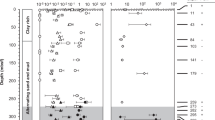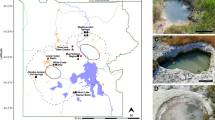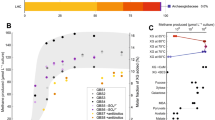Abstract
THE organisms with the highest growth temperature known so far are members of the archaebacterial genus Pyrodictium1'2. These anaerobic sulphur reducers thrive at temperatures of up to 110 °C within a shallow hydrothermal system off Vulcano, Italy. Only a few hyperthermophilic methanogens are known—members of the genus Methanothermus, which grow exclusively within terrestrial fields of fumaroles from which sulphurous gas is emitted and show an upper growth temperature of 97 °C (ref. 3), and some members of the genus Methanococcus, which grow within deep-sea hydro-thermal systems at temperatures up to about 90 °C (ref. 4). We have now isolated a novel group of methanogenic archaebacteria growing at least at 110°C from sediment samples taken by the research submersible Alvin at the Guaymas Basin hot vents (Gulf of California). This finding demonstrates the unexpected biogenic methanogenesis at temperatures above 100 °C, and, in view of biogeochemistry, could explain isotope discrimination at temperatures that were thought to be unfavourable for biological methanogenesis.
This is a preview of subscription content, access via your institution
Access options
Subscribe to this journal
Receive 51 print issues and online access
$199.00 per year
only $3.90 per issue
Buy this article
- Purchase on Springer Link
- Instant access to full article PDF
Prices may be subject to local taxes which are calculated during checkout
Similar content being viewed by others
References
Stetter, K. O. Nature 300, 258–260 (1982).
Stetter, K. O., König, H. & Stackebrandt, E. Syst. appl. Microbiol. 4, 535–551 (1983).
Lauerer, G., Kristjansson, J. K., Langworthy, T. A., König, H. & Stetter, K. O. Syst. appl. Microbiol. 8, 100–105 (1986).
Jones, W. J., Leigh, J. A., Mayer, F., Woese, C. R. & Wolfe, R. S. Arch. Microbiol. 136, 254–261 (1983).
Simoneit, B. R. T., Lonsdale, P. F. Nature 295, 198–202 (1982).
Bazylinski, A. D., Farrington, J. W. & Jannasch, H. W. Org. Geochem. 12, 547–558 (1988).
Wildgruber, G. et al. Arch. Microbiol. 132, 31–36 (1982).
Balch, W. E., Fox, G. E., Magrum, L. J., Woese, C. R. & Wolfe, R. S. Microbiol. Rev. 43, 260–296 (1979).
Seely, R. J. & Fahrney, D. E. Cum Microbiol. 10, 85–88 (1984).
Hensel, R. & König, H. FEMS Microbiol. Lett. 49, 75–79 (1988).
Lonsdale, P. F., Bischoff, J. L., Burns, V. M., Kastner, M. & Sweeney, R. E. Earth planet. Sci. Lett. 49, 8–20 (1980).
Author information
Authors and Affiliations
Rights and permissions
About this article
Cite this article
Huber, R., Kurr, M., Jannasch, H. et al. A novel group of abyssal methanogenic archaebacteria (Methanopyrus) growing at 110 °C. Nature 342, 833–834 (1989). https://doi.org/10.1038/342833a0
Received:
Accepted:
Issue Date:
DOI: https://doi.org/10.1038/342833a0
This article is cited by
-
Role of Temperature in Sludge Composting and Hyperthermophilic Systems: a Review
BioEnergy Research (2022)
-
Microbial Diversity and Biosignatures: An Icy Moons Perspective
Space Science Reviews (2020)
-
Microbial diversity and adaptation to high hydrostatic pressure in deep-sea hydrothermal vents prokaryotes
Extremophiles (2015)
-
Thermophile archaea — RNA im Kochtopf
BIOspektrum (2014)
-
Structure, fluctuation and magnitude of a natural grassland soil metagenome
The ISME Journal (2012)
Comments
By submitting a comment you agree to abide by our Terms and Community Guidelines. If you find something abusive or that does not comply with our terms or guidelines please flag it as inappropriate.



